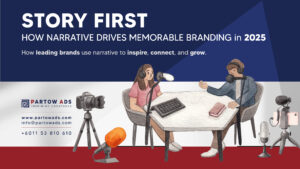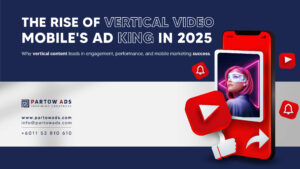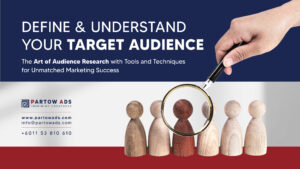
In today’s fast-paced digital landscape, businesses are constantly seeking innovative ways to captivate audiences and elevate their brand presence. With the advent of Artificial Intelligence (AI), advertising and branding strategies have undergone a revolutionary transformation, offering unparalleled opportunities for targeted, data-driven campaigns. As businesses strive to stay ahead of the curve, harnessing the power of AI has become imperative for optimizing advertising efforts and enhancing brand recognition.
At Partow Ads, we understand the pivotal role that AI plays in shaping the future of advertising and branding. With our expertise in cutting-edge technologies and strategic insights, we empower businesses to unlock the full potential of AI-driven campaigns. Let’s delve deeper into how businesses can leverage AI to revolutionize their advertising and branding endeavors.
1- Personalized Marketing:
AI enables businesses to analyze vast amounts of data to gain valuable insights into consumer behavior and preferences. By leveraging machine learning algorithms, personalized marketing campaigns can be crafted to target specific demographics with tailored content, leading to higher engagement and conversion rates. For instance, Netflix utilizes AI to recommend personalized content to users based on their viewing history, thereby enhancing user satisfaction and retention.
2- Predictive Analytics:
By utilizing AI-powered predictive analytics, businesses can forecast market trends and consumer behavior with unprecedented accuracy. By analyzing historical data and identifying patterns, businesses can make informed decisions about their advertising strategies, ensuring maximum impact and ROI. For example, Amazon utilizes AI algorithms to predict customer purchase behavior, enabling targeted product recommendations and personalized marketing campaigns.
3- Dynamic Content Optimization:
AI-driven content optimization allows businesses to dynamically adjust their advertising content in real-time based on user interactions and preferences. Through A/B testing and multivariate analysis, businesses can optimize ad creatives, copy, and placement to maximize engagement and conversion rates. For instance, Coca-Cola utilizes AI to analyze consumer responses to different ad variations, allowing them to tailor their messaging for optimal effectiveness.
4- Chatbots and Virtual Assistants:
AI-powered chatbots and virtual assistants offer businesses a scalable solution for enhancing customer engagement and support. By leveraging natural language processing (NLP) and machine learning, chatbots can provide personalized assistance, answer queries, and facilitate seamless transactions, thereby improving customer satisfaction and loyalty. For example, Starbucks utilizes AI-powered chatbots to streamline the ordering process and provide personalized recommendations to customers.
5- Image and Video Recognition:
AI-driven image and video recognition technologies enable businesses to analyze visual content for insights and opportunities. By leveraging computer vision algorithms, businesses can identify brand mentions, logo placements, and consumer sentiments across various digital platforms, allowing for targeted advertising and brand monitoring. For example, Nike utilizes AI-powered image recognition to identify user-generated content featuring their products, enabling them to engage with their audience and amplify brand advocacy.
6- Sentiment Analysis:
AI-powered sentiment analysis tools enable businesses to monitor and analyze consumer sentiments and brand perception in real-time. By leveraging natural language processing (NLP) algorithms, businesses can gain valuable insights into customer feedback, social media conversations, and online reviews, allowing them to adapt their advertising and branding strategies accordingly. For example, Airbnb utilizes AI-powered sentiment analysis to gauge customer satisfaction and identify areas for improvement in their service offerings.
7- Hyper-Targeted Advertising:
AI enables businesses to hyper-target their advertising efforts by identifying and reaching niche audience segments with precision. By leveraging predictive analytics and machine learning algorithms, businesses can identify high-value prospects and deliver personalized ad content across various digital channels, resulting in higher conversion rates and ROI. For example, Spotify utilizes AI to analyze user listening habits and preferences, allowing them to deliver targeted audio ads to specific audience segments.
8- Augmented Reality (AR) and Virtual Reality (VR):
AI-powered AR and VR technologies offer businesses innovative ways to engage and immerse their audience in their brand experiences. By leveraging computer vision and machine learning algorithms, businesses can create interactive and personalized AR/VR content that showcases their products and services in a captivating manner, driving brand awareness and engagement. For example, IKEA utilizes AR technology to enable customers to visualize furniture in their own space before making a purchase decision, enhancing the online shopping experience.
9- Marketing Automation:
AI-powered marketing automation platforms empower businesses to streamline and optimize their advertising workflows with minimal manual intervention. By leveraging machine learning algorithms, businesses can automate repetitive tasks such as campaign scheduling, audience segmentation, and performance tracking, allowing for greater efficiency and scalability. For example, HubSpot utilizes AI to automate lead nurturing processes and deliver personalized email campaigns to prospects based on their interactions.
10- Ethical Considerations:
As businesses embrace AI for advertising and branding purposes, it’s essential to prioritize ethical considerations and data privacy concerns. Transparency, accountability, and consent are paramount in ensuring a positive user experience and maintaining trust with consumers. By adhering to ethical guidelines and regulations such as GDPR, businesses can mitigate risks and build credibility with their audience, thereby fostering long-term relationships and brand loyalty.
In conclusion, the integration of AI into advertising and branding strategies offers businesses unparalleled opportunities for innovation and growth. By leveraging AI-driven technologies such as personalized marketing, predictive analytics, and chatbots, businesses can optimize their advertising efforts, enhance brand recognition, and drive sustainable business outcomes. At Partow Ads, we are committed to empowering businesses with the tools and insights they need to thrive in an AI-driven world. Contact us today to learn how we can help elevate your advertising and branding strategies to new heights.
Contact Partow Ads:
- Phone: +6011 5381 0610
- Email: info@partowads.com
- Website: Partow Ads
#AIinAdvertising #BrandAI #DataDrivenMarketing #PersonalizedAds #PredictiveAnalytics #ChatbotsForBusiness #VisualRecognition #ARVRMarketing #MarketingAutomation #EthicalAIAdvertising
Categorise
Tags
#advertising (11) #advertising-agency (6) #advertising-strategies (4) Branding (7) digital marketing (7) email marketing (1) Marketing (8) partow ads (3) Strategies (2) YouTube Shorts (1)
Recent Posts
- How to Turn Advertising into Sales: A Practical Guide for Businesses

- Story First: How Narrative Drives Memorable Branding in 2025?

- The Rise of Vertical Video: Mobile’s Advertising King in 2025!

- 6 Branding Mistakes Small Businesses Make and How to Fix Them Fast for Better Visibility and Growth

- Mastering the Art of Audience Research with Tools and Techniques for Unmatched Marketing Success





Leave a Reply